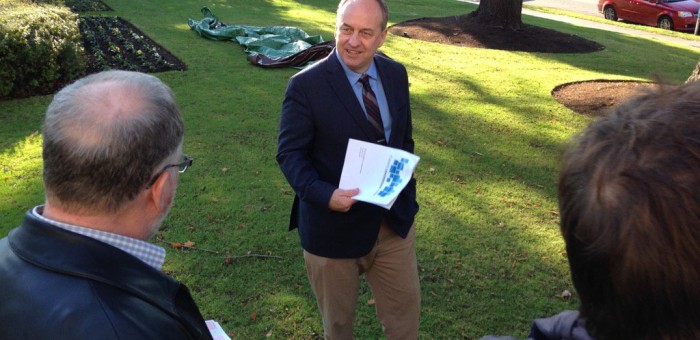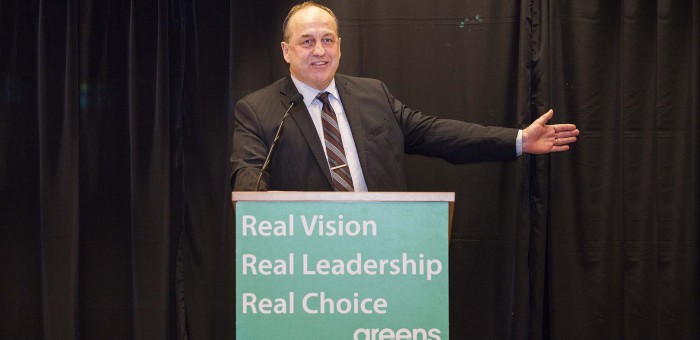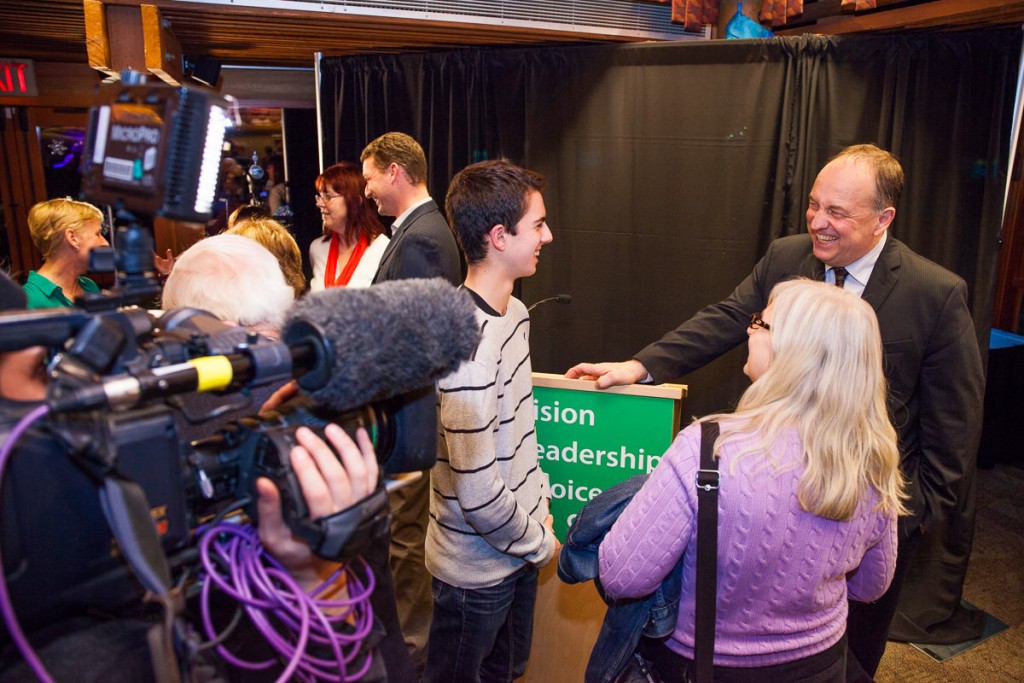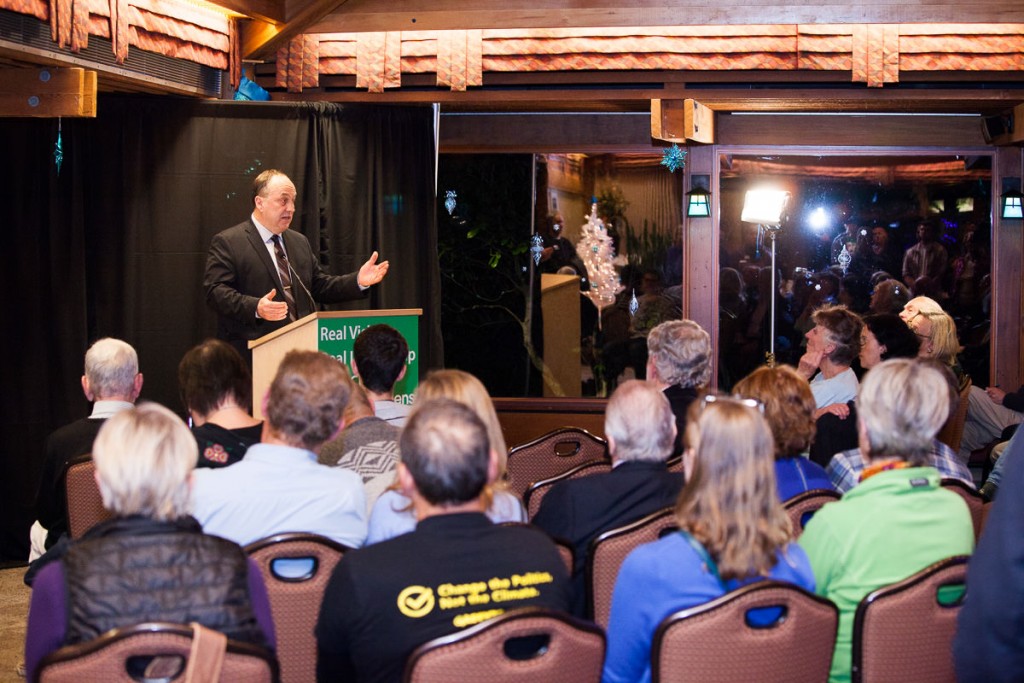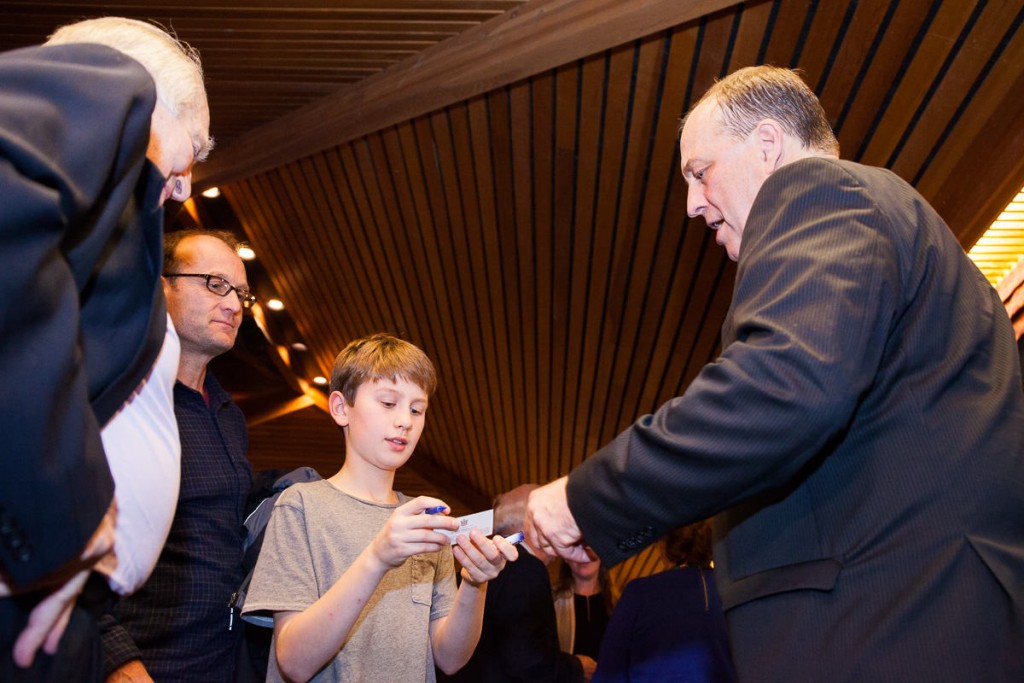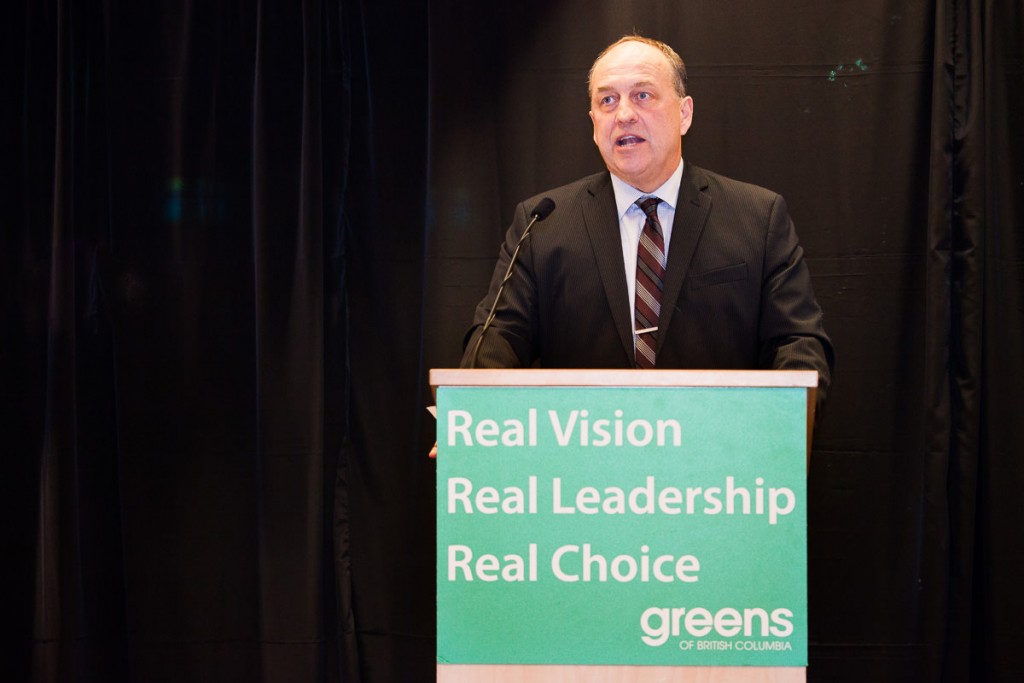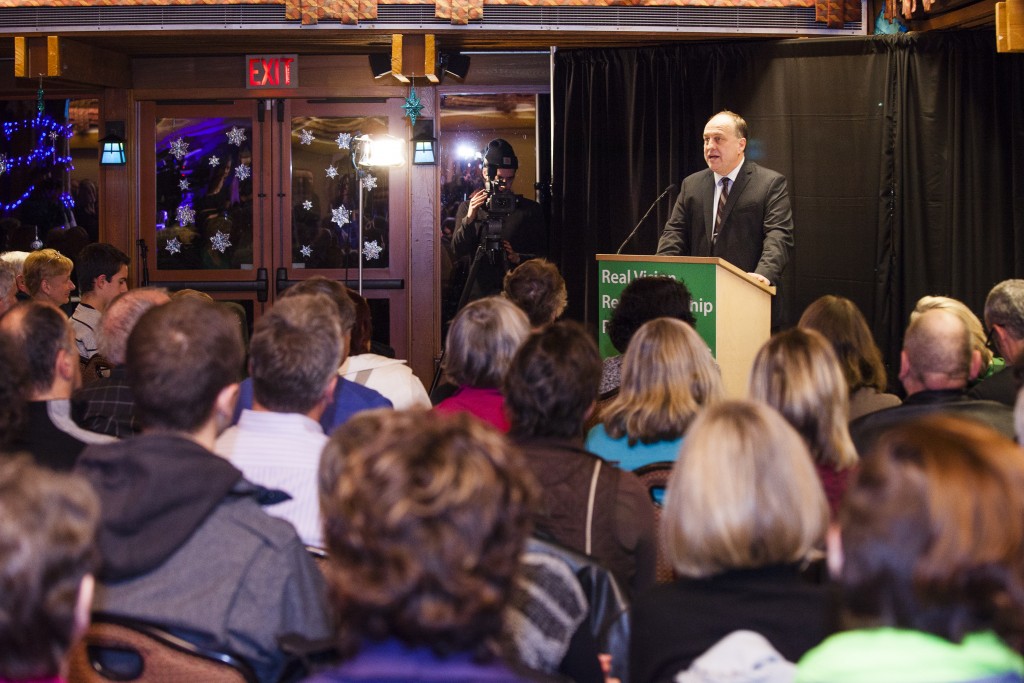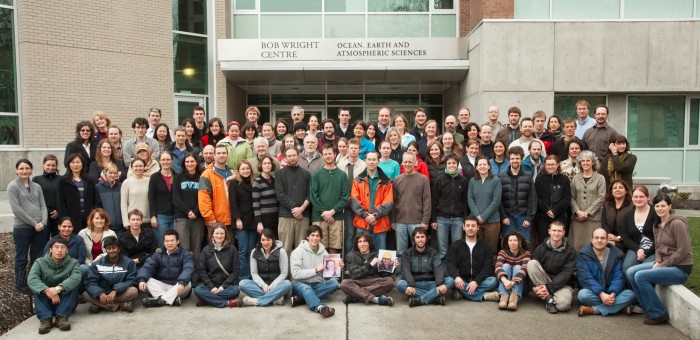Issues & Community Blog - Andrew Weaver: A Climate for Hope - Page 138
Climate Action Recommendations Highlight Inaction of Current Government
Media Release – November 27th 2015
Climate Action Recommendations Highlight Inaction of Current Government
For Immediate Release
Victoria B.C. – Andrew Weaver, MLA for Oak Bay Gordon Head and Deputy Leader of the BC Green Party called today’s release of the Climate Leadership Team’s recommendations the clearest sign yet that Christy Clark’s B.C. Liberal government is failing to demonstrate any leadership in addressing climate change.
The recommendations show that due to the choices this government has made since 2012, there is no longer a pathway to meet our 2020 GHG reduction targets. The government’s response has been to highlight the need for a new 2030 target, with little offered about how we can get there.
“Setting targets is meaningless if the policy isn’t there to go along with it,” said Andrew Weaver. “I am deeply concerned that the government will use these recommendations to advance the political goals of the government, allowing them to talk about leadership now, without having to implement a single policy until after the next election.”
The report was submitted to government on October 31st but not made public until today, preventing any public debate while the legislature was sitting for the fall session. Furthermore this report comes on the last Friday before the Paris COP conference, giving the Premier an opportunity to talk about leadership, without having to commit to a single policy after the fact.
“The release of this document today is in keeping with this government’s approach of saying one thing and doing another,” said Andrew Weaver. “Premier Clark is now able to feign leadership in Paris this Fall, and then announce their true intentions next year when they bring their actual plan forward.”
Andrew Weaver served on the first Climate Action Team, set up by Gordon Campbell in 2007. At the time, the team was told that they had a responsibility to engage with British Columbians about the climate action plan they were developing. This contrasts sharply with the 2015 Climate Action Team set up by Christy Clark, where they were required to sign confidentiality agreements and were prohibited from talking about their work.
“Christy Clark’s government has steadily dismantled the innovative climate policy initiated under Gordon Campbell,” said Andrew Weaver. “The recommendations released today offer one pathway to reclaiming the leadership we have lost. If the government is serious about being a leader, they need to start implementing policy not making promises and setting new targets.”
-30-
Media Contact
Mat Wright
Press Secretary – Andrew Weaver MLA
Cell: 250 216 3382
Mat.wright@leg.bc.ca
Twitter: @MatVic
Parliament Buildings
Room 027C
Victoria BC V8V 1X4
Leadership of the BC Green Party
At the UVic University Club on November 24, 2015 I formally announced my intention to seek the leadership of the BC Green Party. And on December 7, 2015 I was elected by acclamation as our new leader. Below is the text of the speech that I gave at the announcement. In the speech I outlined the reasons why I sought the leadership and I offered a vision for a prosperous future for all British Columbians.
Introduction
Thank you Elizabeth. You’ve been an absolute inspiration to me. And I am honoured that you were able to make it to tonight’s event knowing that you will be heading to the COP21 meeting in Paris imminently.
I’m also very grateful to Claire Martin for coming over from Vancouver to act as our MC. I know that she’s also off to COP21 shortly. And I am especially grateful to Butch Dick from the Songhees nation for welcoming us tonight.
Finally, this event tonight would never have happened if it weren’t for the efforts of the incredible group of individuals that I have the honour of working with: Judy Fainstein, Mat Wright, Evan Pivnick and Karin Lenger along with all of the volunteers. Thank you.
It’s humbling for me to see so many people here. I sincerely appreciate you all joining me this evening and I look forward to answering your questions and chatting with you one on one afterwards.
The University Club in which we stand has a special meaning to me. It first opened in 1967 in the old army hut that stands today as E-Hut. I remember as a little boy being taken by my parents to visit Santa at the annual Christmas parties, including the very first one they hosted. Over the years I’ve had many dinners and attended countless functions in the old E-Hut facility. And in 1982, when Phase II of the University Club was completed — the building we are in now — I had just started my final year of undergraduate studies.
I left Victoria in 1983 and it wasn’t until 1992 that Helen and I returned to our hometown. As a young faculty member I joined the newly created School of Earth and Ocean Sciences, appropriately located in E-Hut, the former location of the University Club. In 1992, if someone would have told me that I would be standing in the University Club as the elected BC Green Party MLA for Oak Bay Gordon Head, I would have thought they were crazy.
I was a scientist. I was a teacher and I had no interest in politics.
Yet two decades later, in the fall of 2012, Jane Sterk, after a number of previous attempts finally convinced me to run in the May 2013 provincial election.
I had spent many years understanding the basic physics of the past, present and future climate system. It became evident that global warming was emerging as the defining challenge of our time, and that there were enormous opportunities available to those jurisdictions that were first to act boldly in transitioning to a low carbon economy.
I advised governments at all levels on available policies that could allow them to seize those opportunities. And I saw British Columbia begin to show leadership by doing just that.
But as the government then shifted all of its efforts, and all of its hopes, to the LNG pipedream, I saw us lose that leadership. I watched as we went from leaders in developing a 21st century economy, to laggards, scurrying back to the 20th century, hoping for an out-dated and unrealistic LNG windfall. For three years now I’ve been saying the same thing. The economics simply does not work for BC to build a thriving LNG industry any time soon.
As I watched our provincial leadership unravel, I was reminded of something I would tell my students. If you want your government to show leadership on the issues that you care about, I would tell them that you need to elect people who will act on your concerns. Or, if you feel like none of the candidates is seriously addressing the issues you are worried about, you should consider running for office yourself.
Ultimately, I decided that I needed to take my own advice. I ran for office because I saw an opportunity to help build a vision that would put our province on a path of developing a 21st century diverse and sustainable economy. Now, after 2 1/2 years in office, it’s clear to me that this is more important than ever.
In the shadows of the massive challenges that we face, our province needs new leadership.
Leadership that offers a realistic and achievable vision grounded in hope and real change.
Leadership that places the interests of the people of British Columbia — not vested union or corporate interests— first and foremost in decision-making. And it’s not only today’s British Columbians that we must think about, it’s also the next generation who are not part of today’s decision-making process.
Leadership that will build our economy on the unique competitive advantages British Columbia possesses, not chase the economy of yesteryear by mirroring the failed strategies of struggling economies.
Leadership that will act boldly and deliberately to transition us to 21st century economy that is diversified and sustainable.
Leadership that doesn’t wait for public opinion — but rather builds it.
It’s clearer to me now than ever before. The province needs new leadership bringing new ideas, new direction and new people to the legislature. For too many decades British Columbia has had to put up with our two-party dichotomy of dysfunction.
On the left there’s the BC NDP. Frankly there’s nothing new or anything particularly democratic about the BC NDP. On the right we have the BC Liberals. And there is absolutely nothing liberal about the BC Liberals.
Too often British Columbians vote for the BC Liberals not because they like what they stand for, but rather because they dislike what the BC NDP stand for. Too often British Columbians vote for the BC NDP not because they like what they stand for, but rather because they dislike what the BC Liberals stand for. And therein lies our opportunity.
The BC Greens will offer British Columbians candidates, ideas and policy that they can vote for, instead of vote against. It’s time for us to create a third viable option.
And so, with the knowledge of the opportunities and challenges that lie ahead, I announce my candidacy for the Leadership of the BC Green Party.
To an Economic Vision for the 21st Century
We have a unique opportunity in British Columbia to be at the cutting edge in the development of a 21st century economy.
Our high quality of life and beautiful natural environment attract some of the best and brightest from around the globe —we are a destination of choice. Our high school students are consistently top ranked — with the OECD specifying BC as one of the smartest academic jurisdictions in the world. And we have incredible potential to a create clean, renewable energy sector to sustain our growing economy. When we speak about developing a 21st century economy — one that is innovative, resilient, diverse, and sustainable — these are unique strengths we should be leveraging.
Unfortunately, instead of investing in a 21st Century economy, our government has banked all its hopes on an irresponsible, unrealistic fossil fuel windfall, with its Liquefied Natural Gas sector. We are already seeing these promises unravel as we chase a falling stock, doubling down on the way.
A 21st century economy is sustainable — environmentally, socially and financially. We should be investing in up-and-coming sectors like the clean tech sector, and creative economy that create well-paying, stable long-term, local jobs and that grow our economy without sacrificing our environment.
We should be using our strategic advantage as a destination of choice to attract industry to BC in highly mobile sectors that have difficulty retaining employees in a competitive marketplace. We should be using our boundless renewable energy resources to attract industry that wants to brand itself as sustainable over its entire business cycle, just like Washington and Oregon have done. We should be setting up seed funding mechanisms to allow the BC-based creative economy sector to leverage venture capital from other jurisdictions to our province. Too often the only leveraging that is done is the shutting down of BC-based offices and opening of offices in the Silicon Valley.
We should fundamentally change the mandate of BC Hydro. BC Hydro should no longer be the builder of new power capacity. Rather, it should be the broker of power deals, transmitter of electricity, and leveller of power load through improving British Columbia power storage capacity. Let industry risk their capital, not taxpayer capital, and let the market respond to demands of cheap power.
Similarly, by steadily increasing emissions pricing, we can send a signal to the market that incentivises innovation and the transition to a low carbon economy. The funding could be transferred to municipalities across the province so that they might have the resources to deal with their aging infrastructure and growing transportation barriers.
By investing in the replacement of aging infrastructure in communities throughout the province we stimulate local economies and create jobs. By moving to this polluter-pays model of revenue generation for municipalities, we reduce the burden on regressive property taxes. Done right, this model would lead to municipalities actually reducing property taxes, thereby benefitting home owners, fixed-income seniors, landlords and their tenants.
Yes, we should be investing in trade skills, as described, for example, under the B.C. jobs plan. But we should also be investing further in education for 21st century industries like biotech, high tech and clean tech. It’s critical that we bring the typically urban-based tech and rural-based resource sectors together. Innovation in technology will lead to more efficient and clever ways of operating in the mining and forestry industries. Just last week, for instance, I was told the story of a BC-based technology innovator partnering with a local mine to dramatically improve the efficiency and environmental footprint of their mining operations. Rather than hauling thousands of unnecessary tonnes of rock to a crusher for processing, the new technology allowed the rocks to be scanned for gold content on site. This meant that prior to trucking, the company could determine if it was more cost-effective to simply put the rock to one side for use as fill later.
Natural gas has an important role to play. But, we should use it to build our domestic market and explore options around using it to power local transport. BC businesses such as Westport Innovations and Vedder Transport have already positioned British Columbia as an innovative global leader in this area.
We should be investing in innovation in the aquaculture industry, like the land-based technologies used by the Namgis First Nation on Vancouver Island who raise Atlantic salmon without compromising wild stocks.
The logging industry is booming yet we send record amounts of unprocessed logs overseas. Now is the time to retool mills to foster a value-added second growth forestry industry.
These are just a few ideas that could help us move to the cutting edge in 21st the century economy.
Fundamental to all of these ideas is the need to ensure that economic opportunities are done in partnership with First Nations. And that means working with First Nations through all stages of resource project development – from conception to completion.
To the issue of Affordability
A 21st century economy must also be an affordable one.
Right now, over half a million British Columbians are currently living in poverty. Today’s report issued by the BC Child and Youth Advocacy coalition noted that one in five children overall in BC live in poverty. More than 50% of children in single-parent families live in poverty. This is unacceptable.
The government responds to these facts with the same old mantra: It can’t do more until the economy grows. Yet, we hear year after year from the government that the economy is growing. The fact is, we have seen growth, we have money to invest, and we know that if we invest capital smartly we will actually save in operating costs. So let me offer just one or two ideas of where we should start:
Let’s fix the Registered Disability Savings Plans and Registered Educational Savings Plans. Currently, RDSPs and RESPs do not receive the same protection that RRSPs and RRIFs do when a family or individual is faced with bankruptcy. This means that when faced with bankruptcy, these already vulnerable individuals lose the one thing that would otherwise provide a glimmer of hope for a financially stable future. By simply providing creditor protection for disabled individuals and children’s education funds we can make the pathway out of poverty that much easier for those individuals experiencing bankruptcy. And let me be clear: This is a policy change—it doesn’t cost anything.
At the same time we know from other jurisdictions, that by providing chronically homeless individuals with a home through Housing First Policies, we not only provide individuals with a basic human right — shelter — but also better health outcomes, all while realizing long-term, overall net savings to government.
Medicine Hat saw a 26% decrease in emergency shelter use in just four years and has housed over 800 people, including over 200 children. Utah has reduced chronic homelessness by 72% as of 2014. A housing first pilot project in Denver, Colorado found emergency related costs and incarceration costs declined by 72.95% and 76% respectively, while emergency shelter costs were reduced by an average of $13,600 per person. Canada’s own At Home/Chez Soi study found that for every $10 invested in housing first services there was an average savings of $21.72.
And we need to deal with rampant speculation in our housing market. Simple steps like closing the Bare Trust Loophole would be effective. Or, as I introduced in a private members bill earlier this year, providing government the means of determining who is purchasing property in B.C. This includes determining both foreign investment flows, the role that corporations are playing in purchasing property and if we have significant speculation coming from other places in Canada.
The solutions to our province’s affordability crisis are out there, and those solutions themselves are affordable. We just need to invest in them. Given everything we know, the question becomes this: how can we afford not to?
To the issue of Health Care
The need for affordability must extend to quality health care too.
We can be proud that B.C. was recently ranked the healthiest province in Canada. This ranking shines a positive light on the healthy lifestyle choices British Columbians make each day. Yet, while we celebrate our successes, we must also remember that our health care system faces serious challenges.
With a highly regressive health care funding system, an aging population, major gaps in primary care, and surgery waitlists lasting anywhere from months to years, it is time for government to take a serious look at how our Health Care System is funded and administered.
British Columbia is the only province in Canada that continues to charge MSP premiums. Such premiums unfairly burden low and fixed income British Columbians with an overly heavy tax burden. With individuals earning a net annual income of $30,000 paying the same monthly flat fee as those earning $3,000,000 per year, it is evident that MSP premiums are perhaps the most regressive form of taxation in B.C.
Instead of charging MSP premiums, we should look at shifting to alternative, more progressive options such as was done in Ontario and Quebec. Rather than flat-rate fees, health premiums can be paid through the personal income tax systems. This avoids the regressive effects of flat-rate premiums and diminishes the additional costs associated with administering the MSP program.
But it can’t stop there. We also need to address the growing gaps in primary care. Doctor shortages and long wait times to get an appointment have led to increased use of walk-in clinics and emergency room services. Unfortunately, this can be costly for both patients and our health system, as a lack of follow-up and co-ordination can mean problems are missed or poorly managed.
Let’s look at investing more in Nurse Practitioners to help close some of these gaps and provide the high quality and timely care that British Columbians pay for and need. Let’s find more effective ways of funding these Nurse Practitioners. Let’s re-examine our approach to the delivery of chronic care services. Relying on acute care services, such as walk-in clinics and hospital emergency rooms, to deal with chronic health issues is both costly and inefficient.
Let’s consider increasing community and at-home care programs, which have been shown to provide better care at a more affordable cost. And let’s lobby the Federal government for our fair share of Canadian Health Transfer revenue, a share that reflects our demographics and the actual cost of delivering health services.
The possibilities for improving our health care system are plenty. As our population continues to age and gaps in primary health care continue to grow, it is more important now than ever to commit to re-examining how we provide affordable, quality health care in B.C.
To the issue of Education
Public education represents perhaps the most important investment government can make for the prosperity of our province. Each and every one of us has attended school and that experience has shaped who we are, what we do and how we contribute to society. And public education is absolutely critical in teaching the next generation of British Columbians to think critically, contribute responsibly to society, and become the leaders of tomorrow.
Given this, why have we not shown more leadership in the Education sector?
At the end of the strike last year, the government spoke about “an historic six-year agreement…which means five years of labour peace ahead of us.”
The implication of this sound bite is NOT that government is stepping up to the task of finding new ways to fund and deliver a leading public education system. The reality is that they are stepping back, allowing their dysfunctional relationship with teachers to simmer, only to boil over again in a few years.
We are stepping back despite an overall 18% and a whopping 44% aboriginal six-year high school non-completion rate. We have school boards at a loss for how to fund their operations due to seemingly endless budget cuts. Surely this is not indicative of a government properly valuing publication education.
It is time for the government to take leadership.
Leadership means ensuring that the resources needed for success are provided. Over the last 13 years, education funding as a percentage of provincial GDP has declined from a high of about 6.4% to an estimated low of about 5.0%. This is not indicative of a government that is prioritizing education. We need to find new, progressive funding sources to reinvest in education.
Leadership means acknowledging that behind the curtain of the BC Public School Employers’ Association is the provincial government. Yet it is the government, not BCPSEA, that draws the lines in the sand on funding. By dismantling the BCSPEA and bringing its operations back into government, a signal could be sent that government is serious in developing a new relationship with teachers.
Leadership also requires a clear eyed assessment of what’s working, and what isn’t – and clearly a ‘one size fits all’ approach isn’t working. The needs on Haida Gwaii, are different from those on Vancouver Island which in turn are different from those in Surrey or Prince George. Now is the time to explore whether or not class size and composition negotiations are better conducted at the school district level instead of the provincial level.
The status quo on education isn’t addressing the growing challenges. We cannot wait until the next labour dispute. Now is the time to sit down with stakeholders and start a dialogue about what a 21st century education system looks like, including how it is funded.
To the issue of Leadership
Our present provincial political leaders seem to have forgotten the essential traits of a successful leader: being principled, honest, authentic, trustworthy and having integrity. Our political leaders must have the courage to be honest with British Columbians about the risks and consequences of any government decision. Honest about the consequences of reckless hyperbole of government promises.
Perhaps the most striking illustration of the lack of honesty in BC’s political discourse has to do with LNG. In the lead-up to the last election, British Columbians were sold a bill of goods by this government. The promise of 100,000 jobs, a $100 billion prosperity fund, a $1 trillion hit to GDP, a debt-free B.C. and on and on.
This government has spent the last three years touting B.C.’s imminent LNG industrial boom. They sent a signal to the market that if industry wanted to do business in B.C., it had better have something to do with LNG. Yet BC’s venture into LNG has been a monumental failure.
The undeniable truth is that British Columbians were sold a bill of goods in that last election that will not come to pass.
Unfortunately it is British Columbians who will bear the consequences of the BC Liberal decisions.
The government’s all in approach on LNG has seen us lose our place of leadership in developing a 21st century economy.
But it’s not too late to reverse this. What we need is a renewed commitment to evidence-based decision making, and a government that is honest with its citizens.
Leadership builds public opinion – it doesn’t follow it. We need politicians who put the good of the province ahead of the good of the party.
This is the type of leadership that is absent from both the BC LIberals and the BC NDP. The BC Liberals will tell you whatever it takes to win. The BC NDP take positions based on what the BC Liberals do, rather than on what the evidence tells us. They try to be all thinks to all people and hence are paralysed by the decision-making process.
One only needs to sit in the legislature for a single debate to see that positions are taken based on the politics of an issue, rather than the evidence behind it.
British Columbians expect more than this. They want to see government acting to help all British Columbians – not merely those who voted – or funded them. This means an honest and open commitment to seek out perspectives and ideas of others and evaluate them based on their merit. Not their source.
To the issue of Choice
There is a choice that we will face in 2017. Another four years of the same old, same old politics as usual that has been working for far too long against the interests of British Columbians, or a new approach to politics that will focus on putting the interests of British Columbians first.
The BC Green Party is the only party that will offer British Columbians a real choice and a real vision for the province. We will offer real leadership with new candidates who run to put British Columbians first and break down the dysfunctional cycle of partisan politics that has dominated British Columbia for far too long.
It will take all of us to bring this vision forward. We have a lot of hard work ahead of us.
But together we will build a prosperous future for all British Columbians.
Thank you everyone for coming tonight and I look forward to your support in the lead up to the 2017 provincial election.
CBC Radio Interview Shortly Before the Event
Multiculturalism Grants Program
Community Organizations throughout British Columbia have until December 13th, 2015 to apply for the Provincial Government’s Multiculturalism Grants Program.
Offered by the Ministry of International Trade and Responsible for Asia Pacific Strategy and Multiculturalism and administered by the Gaming Policy and Enforcement Branch, Multiculturalism Grants support cultural expression and anti-racism programs and projects that raise awareness about or enhance B.C.’s multicultural identity.
Organizations can apply for a grant through two streams:
Stream A: Cultural Expression – Projects which raise awareness about B.C.’s rich multicultural identity through cultural events and/or resource tools. This could include festivals, community forums, cultural celebrations and materials that support positive expressions of culture and traditions in a community.
Stream B: Anti-racism – Projects that challenge racism and hate, especially those that utilize a collaborative and community approach. This could include community forums, public engagement sessions, interfaith dialogues, collaborative arts projects (dance, theatre, visual arts) and educational workshops that engage community members in addressing racism and hate.
For more information on the program and how to apply, please click here.
Bill 41 — Miscellaneous Statutes Amendment Act (No. 3), 2015
Today at Committee Stage I asked two questions seeking clarification from the Minister of Advanced Education as to the type of fees that are collected by Student Societies and whether or not these are what he had in mind with respect to the new legislation. More details are available in my second reading comments.
The Minister’s answer was quite clear that “From our perspective, what [student societies] do with the funds they collect under [the student society] fee heading is up to them. We have no intention of getting involved in what they do, particularly at the student society level.” This suggests that a way to get around some of the concerns still being raised would be to roll as much a possible into the student society fees.
Below is the exchange I had with the Minister.
Question 1
A. Weaver: I’m just trying to seek clarification from the minister specifically with respect to the University of Victoria and, presumably, other universities as to the type of fees that are collected and whether or not these are what he had in mind.
If you’re a student going to the University of Victoria, you’re required to pay student fees for the UVic Students Society, fees set through earlier referenda; the UVSS renovation fee, set through referendum for the renovations of the student buildings; a UVic athletics fee only for on-campus people, again set through referendum at a time back in history; a UVSS bus pass, also set through referendum; UVSS dental plan and UVSS extended health plan, both of which you are able to opt out — as, I believe, is the case for every university I’ve talked to — if you have other dental plans existing.
Now, what I’m asking here is if these are the type of fees, in light of the information I gave, that the minister believes would be required to be paid anyway by a student who withdrew from the university student society? And I have a small follow-up on one of these after that answer.
Answer
Hon. A. Wilkinson: The member lists a number of fees, and it’s a bit of a sample of the range of fees found at our 25 institutions, the Justice Institute being the one organization that does not have a student society and therefore has no appropriate fees in this category.
The opt-out arrangements for at least two of the fees indicate that of the somewhere between 100 and 200 different fees we are addressing here, that will require consultation with the student societies and the universities and colleges involved to ascertain which ones should be put into which category.
Question 2
A. Weaver: Just a quick follow-up here. The UVic Student Society fee is one that students are required to pay to keep the ongoing governance of the UVic Student Society.
That student society fee subset monies to organizations like the UVSS Food Bank and Free Store, the anti-violence project, the Society for Students with a Disability, the Native Students Union, UVSS Students of Colour Collective and the UVic Pride collective, amongst others.
My specific question here is: if the students are paying one fee, that is the UVic Students Society fee, and the students society makes decisions within that on how those funds are spent, is the minister talking about having them have each and every subset of their overall student fee being approved by the ministry? Or is it just the one fee?
One of the overarching concerns is that micromanagement, at the level of the government, will be to look at each and every decision being made by a student society in a student society fee. Could the minister please provide clarification on that?
Answer
Hon. A. Wilkinson: I hope that the remarks I’m about to make will be reassuring to the student societies and to the members opposite. The anticipation is that there’ll be no change in the structure, content, nature or collection of student society fees through this process. The student societies assess fees, which are widely variable around the province. From our perspective, what they do with the funds they collect under that fee heading is up to them. We have no intention of getting involved in what they do, particularly at the student society level.
I thought we had made this reasonably clear in the conference call on November 2, but if there is any remaining anxiety amongst the student societies and unions or amongst the members opposite, I hope this has succeeded in allaying those fears.
Video of the Exchange
A Bill to Reduce Preferential Treatment of Non-Resident Hunters
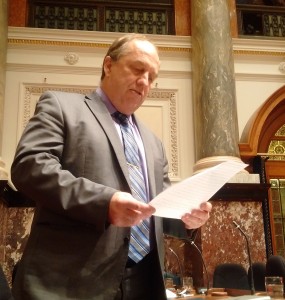 Today in the legislature I tabled a private members bill entitled: Wildlife Amendment Act (No. 2), 2015. The purpose of this Bill was to reduce the preferential treatment of non-resident hunters.
Today in the legislature I tabled a private members bill entitled: Wildlife Amendment Act (No. 2), 2015. The purpose of this Bill was to reduce the preferential treatment of non-resident hunters.
Limited entry hunting (LEH) is a lottery based management system used to organize the harvest of species in situations where there are too few animals and too many hunters. Currently the Wildlife Branch has different rules for resident and foreign hunters when it comes to obtaining LEH permits: Residents must enter a lottery draw, but foreigners (who are required to hire guide) can simply buy their way in. By eliminating the minister’s discretion to make separate rules for each group, this bill requires ALL hunters to enter a lottery for their LEH tags, as is done in other jurisdictions.
As it currently stands, residents may enter a lottery year after year and still not get drawn, while a non-resident can buy his or her way in every year if they want. This bill seeks to ensure certain groups do not have unfair access to LEH permits.
While people may wonder why we need a lottery system for non-residents when they are already restricted by the allocation split, it is worth noting that the split between permits allocated for resident and non-resident hunters is as high as 60% – 40% for some species. By comparison, Alberta sets non-resident allocations between 2-7 percent with a maximum of 10 percent and Washington State has limited non-resident wildlife allocations to approximately 5 percent. Non-resident hunters in B.C. are already getting a bigger share here than anywhere else in North America – and they are pay significantly less too. A non-resident hunter coming to B.C., for example, can buy a moose tag directly for $250.00 Canadian. In Washington State they would have to enter a draw and if their application got randomly selected they would have to pay $1,652.00 USD.
The price and availability of hunting permits is, of course, influenced by animal abundance and hunter demand. In B.C. compared to other jurisdictions in North America, however, they also seem to favour guide outfitters and their non-resident clientele over resident hunters. I tabled this bill today to reduce some of that unfair legislation.
Below I provide a video of my introduction along with its transcript. At the end i also include a copy of the proposed bill
Video of Bill Introduction
Text of Bill Introduction
A. Weaver: It’s my pleasure to introduce this bill — which, if enacted, would remove the minister’s ability to designate and exempt classes of applicants from having to enter lotteries or other methods of random selection when seeking limited-entry hunt permits. If enacted, these amendments would require all hunters to enter draws for their limited-entry hunt permits, regardless of resident, non-resident or non-resident alien designation, as is done in other jurisdictions.
As it currently stands, local hunters have to enter a lottery if they want to harvest an animal managed under the limited-entry hunt system, but out-of-province hunters can simply buy a permit for the same species and management unit area. Foreign hunters coming to B.C. already enjoy cheaper permits and greater allocation percentages than nearly every other jurisdiction in North America. It’s clearly unfair that they can buy their way into limited-entry hunts year after year, when British Columbians are left entering lotteries in the hopes of being granted the opportunity to harvest a public good in their home province.
The limited-entry hunt system is an important management and conservation tool. Its designation through the lottery system should be implemented across the board, mirroring other jurisdictions that require non-resident hunters to enter limited-entry hunt lotteries. Like every state in America, this legislation envisions a separate draw for local and out-of-province allocations.
I look forward to second reading of this bill. I move that this bill be placed on the orders of the day for second reading at the next sitting of the House.
Text of Bill M230
Wildlife Amendment Act (No. 2), 2015,
THE WILDLIFE ACT [RSBC 1996] Chapter 488. The Act is amended by:
Section 16 of the Act is amended by striking out sections 16 (1) (b.1) and 16 (3)
Limited entry hunting authorization
16 (1) The minister, by regulation, may
(a) limit hunting for a species of wildlife in an area of British Columbia,
(b) provide for limited entry hunting authorizations to be issued by means of a lottery or other method of random selection among applicants,
(b.1) provide for exceptions that the minister considers appropriate to the random selection among applicants in conducting a lottery or other method of random selection among applicants under paragraph (b), and
(c) do other things necessary for the purposes of this section.
(2) An application fee collected under a lottery or other method referred to in subsection (1) must be paid into the general fund of the consolidated revenue fund.
(3) In making regulations under subsection (1), the minister may define classes of applicants and make different regulations for different classes of applicants.

